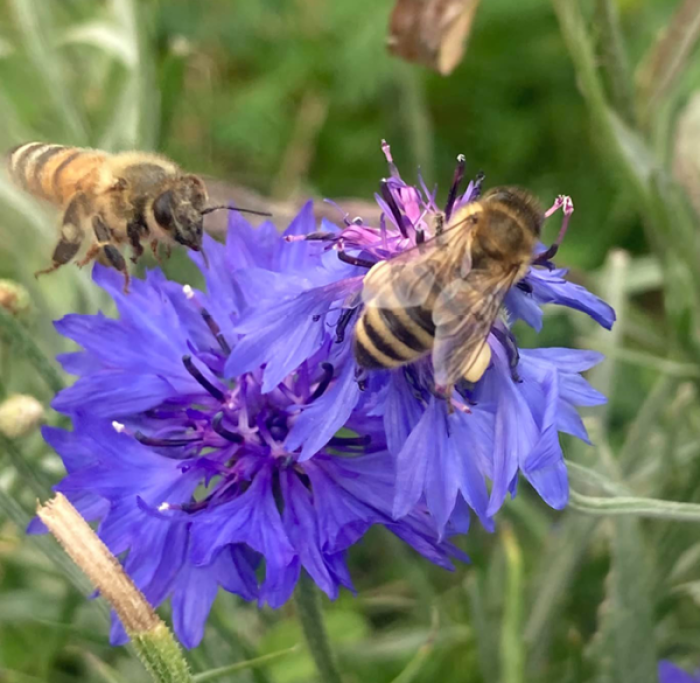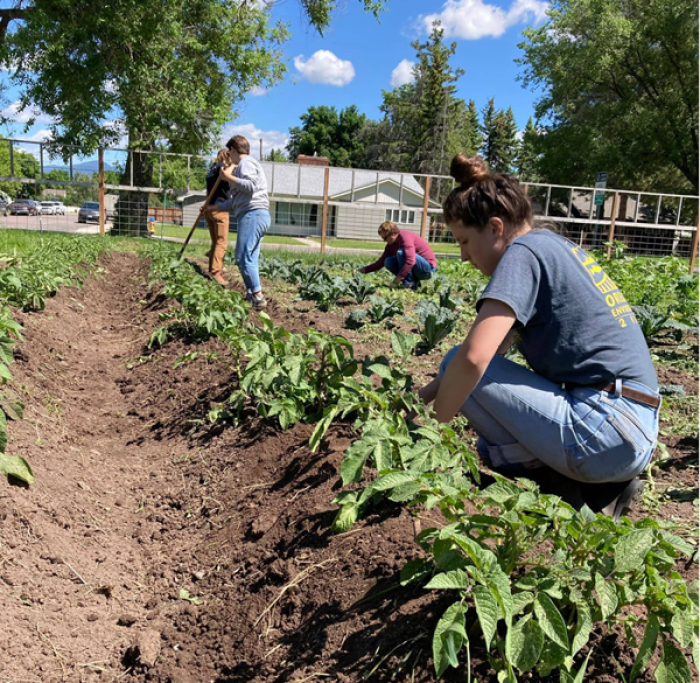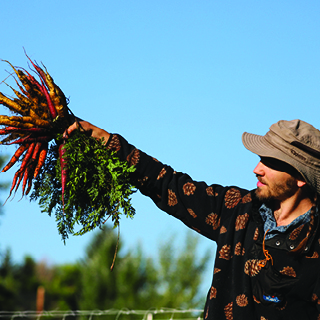Sustainability

Mission
We practice sustainability daily through research, outreach, and innovation.
Vision
We aim to fulfill today's campus needs by reducing harm, supporting our community, and forging connections, all without compromising the ability of future generations to do the same.
Guiding Principles
Campus Dining is committed to limiting our impact on the environment. We have a responsibility to look critically at how our campus impacts our community and the environment and to invest in strategies that mitigate harmful outcomes through sustainability initiatives.
To us, sustainability means that our business choices are community-based, ecologically sound, socially just and economically viable. Central to our goal of sustainability is purchasing locally and sustainably produced goods, conserving water and energy, reducing and diverting waste, educating our community, and collaborating with campus and community partners.


Campus Dining Receives National Award
Campus Dining took home a bronze medal in the National Association of College and University Food Service’s sustainability awards in the procurement category for its unique partnership with local rancher KOP Beef.
Campus Agriculture
Campus Dining operates almost a half-acre of garden space using sustainable practices to create healthy soil and beautiful vegetables. The garden provides thousands of pounds of produce each year and serves as a learning laboratory for students and visitors. We use a diversity of techniques to grow more than 90 varieties of fruits and vegetables that are used at our operations across campus – everything from apricots to zucchini!
Animals are a critical part of any healthy agricultural system. UM Campus Dining has three French white muscovy ducks which provide pest control, fertilizer, delicious eggs, and merriment to all who meet them. We have a thriving apiary of honeybees who pollinate and share their honey with us. The Campus Dining Garden also invites wild animals to be a part of our ecosystem through native flowers, bat houses, soil building, and mason bee houses.
Year-round, microgreens flourish under fluorescent grow lights adjacent to the Food Zoo dining room in the Lommasson Center. Campus Dining grows hundreds of pounds of these nutritious little greens every year! You will find them regularly on our salad bars. Try them heaped on a sandwich or as a flavorful garnish for soup.
The garden offers internship, employment, and volunteer opportunities every semester. Contact UMCDGarden@umontana.edu to learn more.
Campus Agriculture
We not only serve great food, we grow it, too. Together, these provide thousands of pounds of fresh food to our dining centers each year, and function as learning laboratories for students and visitors. Our agricultural programs are working models of sustainable systems, where diverse production practices are used to grow high-quality produce, healthy soils and happy ducks.

Ducks
Meet Rhubarb, Marigold, and Marjoram, Campus Dining’s three French muscovy ducks who make their home at the Iron Griz Garden on South Avenue. These friendly, industrious residents play a vital role by eating bugs and grubs in the garden.

Migrogreens
Springing forth beneath fluorescent grow lights outside the Food Zoo dining room, thousands of tiny sprouts make their way to our restaurants and salad bars. Campus Dining grows hundreds of pounds of these nutritionally power-packed greens every year. Try them heaped on a sandwich or as a garnish for soup.

Bees
Nothing complements a garden like a hive of honey bees. On top of providing pollination for our crops, these busy bees are kind enough to make extra honey for us to use in our locations.

Iron Griz Garden
The Iron Griz Garden on South Avenue provides UMCD a half-acre of growing space for 90 varieties of fruits and veggies, a small orchard, and plenty of opportunities for students and the community to get their hands dirty.
Purchasing
Creating a better food system starts with buying better food!
Here at Campus Dining, we are committed to procuring the highest quality food for our guests. We believe that the most delicious food comes from local farmers, growers, producers and businesses. Knowing our suppliers is at the heart of Campus Dining’s sustainable procurement initiative.
Hyper-local
Grown/raised, produced, processed, and distributed within Missoula, Flathead, Lake, Powell, Sanders, Mineral, Ravalli, Granite County
Local Vendor Highlights
-

KOP Beef
Turah, MT
Campus Dining partners with local ranchers Doug and Dana Kopp to purchase the beef used in our restaurants and dining hall. Located in Turah, KOP Beef’s grassfed cattle are hormone- and antibiotic-free and humanely raised less than 11 miles outside Missoula. Their diet is supplemented with the spent grain from KettleHouse Brewery. The beef is then processed locally at Lolo Locker. It’s a win-win-win!
-

Western Montana Growers Co-Op
Headquartered in Missoula, Montana, Western Montana Growers Cooperative (WMGC) is a coalition of growers in the Flathead, Jocko, Mission and Bitterroot Valleys whose goal is to provide our region with fresh, quality products from area farms. Campus Dining purchases a variety of fresh fruits, vegetables, legumes, mushrooms, meats, and cheeses from WMGC every week. The co-op is our primary connection to local, sustainably produced, organic produce. WMGC simplifies the process for us as a large foodservice outlet and allows us to purchase more local food than we could otherwise source ourselves.
-

Black Coffee Roasting Company
Missoula, MT
Black Coffee Roasting Company sources certified fair trade and certified organic coffee from all over the globe. They roast it locally in an ultra-efficient Loring roaster. All of their coffee is packaged in recycled biodegradable bags. Here at Campus Dining, we can’t seem to get enough of their delicious roasts and blends.
-

Bernice’s Bakery
Missoula, MT
We love supporting female-owned and operated businesses. Bernice’s Bakery has been a Missoula gem since 1978. We purchase a variety of scratch-baked goods and love that this business puts good food and community at the forefront of everything they do.
-

Local Bounti
Hamilton, MT
Campus Dining supports innovative agricultural practices. Local Bounti is a hyperlocal company doing just this. Local Bounti grows a variety of green leafy vegetables using efficient hydroponic growing systems. The company uses 90% less water and 90% less land than traditional agriculture. There is no need for herbicide and pesticide. Their sustainable, root-on, living product results in less environmental impacts, carbon footprint, and less waste.
-

Cool Earth Creamery
Missoula, MT
Cool Earth Creamery is a unique business to have right in our backyard. Cool Earth Creamery built the infrastructure to turn locally grown, organic crops into delicious, nutritious plant-based milks right here in Missoula, MT. Even better, Cool Earth takes a stand against unnecessary packaging and waste. The company uses only reusable packaging. Campus Dining returns all plant-based milk containers back to Cool Earth to be washed, refilled, and used again.
Waste
- Upstream initiatives (preventing waste):
- Trayless dining
- LeanPath Waste Management System
- Promoting reusables (to-go program, reusable container incentive)
- Downstream efforts (managing the waste we do generate, responsibly):
- Composting. We compost pre- and post-consumer waste in the Food Zoo. We recently introduced zero-waste stations in the UC Commons and Rise+Rooted so guests can partner with us in our efforts! Coffee grounds are saved from all Campus Dining locations and taken to the UC Gardens or Garden City Compost.
- Donating. Excess food is donated to local shelters and food banks.
- Packaging. We eliminate single-use packaging wherever possible. We purchase packaging that is plant-based and compostable.
Culinary Innovation and Menus
When it comes to environmental and human health, some of the most important decisions we make start with what we eat. At Campus Dining, we build our menus around scratch cooking—using tons of fresh fruits and vegetables and high-quality proteins while avoiding processed foods that are high in added sodium and sugar. We’re also working to promote more plant-forward diets since diets that contain fewer animal products have smaller environmental footprints and are generally better for human health.
Sustainable. Seasonal. Local.
Whether it’s apples from the Bitterroot Valley, cherries from Flathead Lake, or the Dixon melons available for only a few short weeks in late summer, Campus Dining seeks out the unique local culinary treasures of Montana. Our chefs make sure that students at University of Montana get a chance to truly savor everything that Montana has to offer. This starts with working hand-in-hand with our own garden manager to make sure that as much produce as possible comes from Campus Dining’s own garden. After that we seek out and partner with small local businesses and companies with a strong commitment to sustainable practices. The salsa on your tacos came from a local Missoula business, the bread for your sandwich was made with wheat from Montana, and the beef was raised and processed less than 30 miles from Missoula. Every product is one small step towards a better future for the generations to come.
Education and Outreach
Campus Dining supports a variety of educational opportunities through internships, volunteer positions and student employment. Employees, volunteers and interns gain valuable experience in everything from culinary skills and menu design to permaculture gardening, nutrition, and local food procurement. Helping students engage with their campus and community food system is one of Campus Dining’s most important roles.








